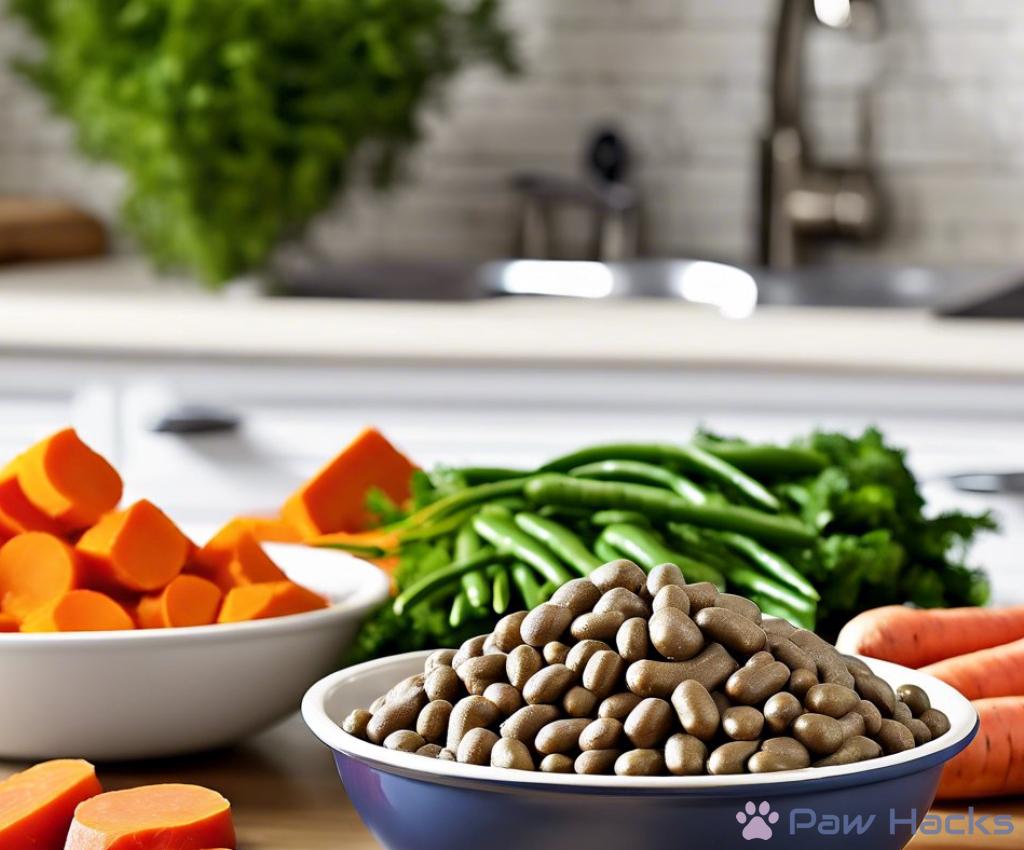Nutritional Support for Senior Dogs
Essential Nutrients for Your Senior Dog’s Health

Understanding the Nutritional Needs of Senior Dogs
As dogs age, their nutritional requirements change significantly. Senior dogs often experience a decline in metabolism and may face health issues such as arthritis, dental problems, and kidney disease. This makes it essential for pet owners to understand the critical nutrients that can help maintain their dog’s health and vitality. Proper nutrition not only enhances their quality of life but can also prolong their lifespan.
Key Nutrients to Consider
When it comes to formulating a diet for your senior dog, focusing on specific nutrients can make all the difference. Below is a list of essential nutrients that should be included in their diet:
- Protein: Senior dogs need high-quality protein to maintain muscle mass and support overall health. Look for sources like chicken, turkey, and fish.
- Omega Fatty Acids: These are crucial for maintaining healthy skin and coat, as well as joint health. Fish oil or flaxseed oil can be beneficial.
- Fiber: Increased fiber helps with digestion and can prevent obesity, which is common in older dogs.
- Vitamins and Minerals: Essential vitamins like A, C, D, and E, as well as minerals such as calcium and phosphorus, support immune function and bone health.
- Antioxidants: Nutrients like blueberries and spinach help combat oxidative stress and promote longevity.
Feeding Strategies for Senior Dogs
In addition to understanding what nutrients are essential, how you feed your senior dog can also impact their health. Consider the following strategies to ensure your furry friend receives the best care:
- Portion Control: Monitor portion sizes to prevent obesity. Adjust food amounts based on your dog’s activity level and weight.
- Meal Frequency: Instead of one or two large meals, consider feeding smaller, more frequent meals to help with digestion.
- Hydration: Ensure your senior dog has access to fresh water at all times, as hydration is crucial for kidney health.
- Consult Your Veterinarian: Regular check-ups are essential. Your vet can provide personalized dietary recommendations based on your dog’s specific health needs.
Tailoring Diet Plans for Aging Canines: What to Consider

As our beloved dogs advance in age, their dietary requirements become increasingly unique. Unlike their younger counterparts, senior dogs may not only have different nutritional needs but also specific health concerns that necessitate careful planning of their meals. Tailoring a diet plan for your aging canine involves understanding these needs and making informed choices that promote their well-being.
Understanding Individual Health Conditions
Every senior dog is different, and their health status can vary widely. Some may suffer from conditions like arthritis, which necessitates a diet rich in anti-inflammatory nutrients. Others may face challenges such as kidney disease, requiring a careful balance of protein and phosphorus. Therefore, it’s essential to consult with a veterinarian to assess your dog’s health conditions before implementing any changes to their diet. This personalized approach ensures that their specific needs are met without exacerbating any health issues.
Choosing the Right Ingredients
When planning a diet for senior dogs, it is vital to select high-quality ingredients that cater to their specific health needs. Opt for nutrient-dense foods that are easy to digest. For instance, lean proteins like turkey and fish provide necessary amino acids without the excess fat that older dogs may struggle to process. Additionally, incorporating whole grains like brown rice or oats can offer a source of fiber that aids digestion and helps maintain a healthy weight. Moreover, adding fresh vegetables like carrots or peas not only enhances the nutritional profile but also provides essential vitamins and minerals.
| Ingredient | Benefit | Considerations |
|---|---|---|
| Lean Proteins | Supports muscle maintenance | Choose low-fat options |
| Omega-3 Fatty Acids | Promotes joint health | Includes fish oil or flaxseed oil |
| Fiber-Rich Foods | Aids digestion | Monitor for digestive sensitivity |
In addition to the main ingredients, consider incorporating supplements that can boost your dog’s health. Probiotics can be beneficial for gut health, while glucosamine can help maintain joint function. Always consult your veterinarian before introducing new supplements to ensure they are appropriate for your dog.
Adjusting Meal Plans Over Time
As your dog ages, their dietary needs may continue to evolve. It’s crucial to regularly assess their weight, activity level, and overall health. Adjust portions and ingredients accordingly; for instance, if your dog becomes less active, reducing calorie intake may be necessary to prevent obesity. Additionally, you may find that their taste preferences change, so being open to trying new flavors or textures can keep mealtime enjoyable. Establishing a flexible meal plan allows for adaptation over time, ensuring your senior dog receives the best possible nutrition throughout their golden years.
Hydration Matters: Keeping Your Senior Dog Well-Watered
When it comes to the health and well-being of senior dogs, hydration is a critical yet often overlooked aspect. As our furry companions age, their bodies may become less efficient at regulating water levels, making it vital for owners to ensure that they remain properly hydrated. This not only supports kidney function but also aids in digestion, joint lubrication, and overall vitality. Providing adequate water can be a simple yet powerful way to enhance your senior dog’s quality of life.
Understanding Water Needs is essential for pet owners. Generally, dogs require about one ounce of water per pound of body weight daily, but this can vary based on factors like size, activity level, and environmental conditions. Senior dogs may require more water due to health issues or medications that can affect their hydration levels. It’s crucial to monitor their intake, especially if they show signs of lethargy or decreased appetite, which could indicate dehydration.
Creative Ways to Encourage Hydration can make a significant difference in your dog’s water consumption. Many senior dogs may not drink as frequently as they should, so finding innovative methods to make water more appealing can be beneficial. Adding low-sodium broth to their water or serving wet food can increase fluid intake. Incorporating water-rich fruits and vegetables, such as watermelon or cucumbers, can also be a tasty and nutritious way to keep them hydrated. Another practical approach is to provide multiple water bowls around the house, ensuring they can easily access fresh water wherever they are.
Additionally, keep an eye on the signs of dehydration. Symptoms such as dry gums, excessive panting, or loss of skin elasticity can indicate that your senior dog needs more fluids. If you notice any of these signs, it may be time to consult a veterinarian for tailored advice on improving hydration. Remember, maintaining proper hydration is not just about offering water; it’s about understanding your senior dog’s unique needs and adapting their care accordingly.
Understanding Common Health Issues in Senior Dogs and Their Dietary Needs
Age-Related Health Challenges
As dogs grow older, they often encounter a variety of health issues that can impact their quality of life and nutritional needs. Understanding these common ailments is crucial for pet owners to tailor a diet that supports their furry companions effectively. From joint pain to digestive problems, each condition necessitates specific dietary adjustments to ensure that senior dogs receive the essential nutrients they require.
Navigating Dietary Adjustments for Common Conditions
Senior dogs frequently face health issues such as arthritis, obesity, and kidney problems, each of which demands careful consideration when planning their meals. Below is a list of common health challenges and their corresponding dietary requirements:
- Arthritis: A diet rich in Omega-3 fatty acids can help alleviate joint inflammation. Incorporating fish oil or supplements can provide the necessary anti-inflammatory properties.
- Obesity: Reducing calorie intake while maintaining nutrient density is key. Opting for high-fiber foods can help dogs feel fuller without excess calories.
- Kidney Disease: Limiting protein and phosphorus intake may be necessary. Consult with a vet for tailored advice on suitable protein sources.
Addressing these health challenges through proper nutrition can dramatically improve a senior dog’s overall well-being and mobility.
Creating a Customized Diet Plan
Each senior dog is unique, requiring a personalized approach to their diet based on individual health conditions and preferences. Regular veterinary check-ups can provide valuable insights into the specific needs of your dog. Here are some steps to consider when creating a customized diet plan:
- Assess your dog’s specific health issues in consultation with a veterinarian.
- Select high-quality, easily digestible ingredients tailored to their needs.
- Monitor your dog’s weight and adjust portions accordingly.
- Incorporate a variety of textures and flavors to entice their appetite.
- Stay informed about their health status and be prepared to adapt the diet as necessary.
By recognizing the link between health issues and dietary needs, pet owners can play a vital role in enhancing their senior dog’s quality of life. With thoughtful planning and attention to their unique requirements, you can ensure that your furry friend thrives even in their golden years.
The Role of Supplements in Supporting Senior Dog Nutrition
Enhancing Nutritional Profiles with Targeted Supplements
As your dog reaches their senior years, their nutritional needs can become increasingly complex. While providing a balanced diet is crucial, the addition of supplements can significantly enhance their health and well-being. Supplements are designed to address specific health concerns that often arise in older dogs, such as joint pain, cognitive decline, and digestive issues. By incorporating the right supplements into your senior dog’s diet, you can help them maintain their vitality and improve their overall quality of life.
Key Supplements for Senior Dog Health
When considering supplements for your aging canine, it’s important to focus on those that target common health challenges. For instance, glucosamine and chondroitin are well-known for their ability to support joint health and mobility, making them ideal for dogs suffering from arthritis or joint pain. Additionally, omega-3 fatty acids can help reduce inflammation and promote healthy skin and coat. These fatty acids are especially beneficial for senior dogs as they not only support joint function but also contribute to heart health.
Another vital supplement is probiotics, which can enhance digestion and gut health, a common concern in older dogs. Probiotics help balance the gut microbiome, ensuring that your pet absorbs nutrients effectively. Finally, antioxidants such as vitamins E and C can combat oxidative stress, potentially slowing the aging process and supporting immune function.
Consultation and Customization for Optimal Results
Before introducing any supplements into your senior dog’s diet, it is essential to consult with your veterinarian. They can provide personalized recommendations based on your dog’s specific health conditions and dietary needs. Each dog is unique, and what works for one may not be suitable for another. Regular check-ups will allow you to assess your dog’s response to the supplements and make necessary adjustments to their regimen.
In conclusion, while a well-balanced diet forms the foundation of your senior dog’s nutrition, supplements can provide that extra layer of support crucial for their health. By understanding the role of these supplements and working closely with your veterinarian, you can ensure that your furry friend enjoys their golden years with vitality and joy.
Share this content:



